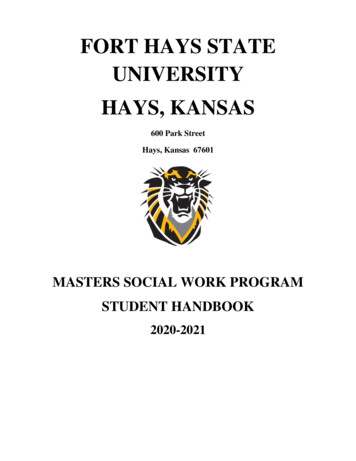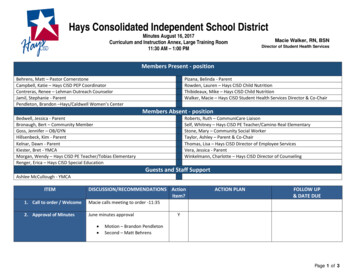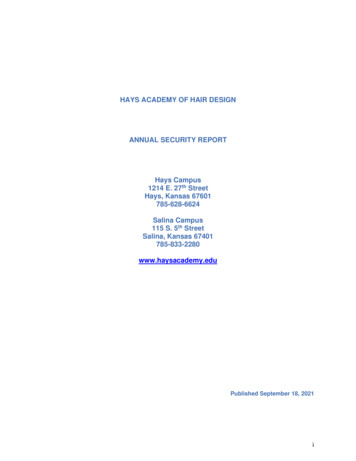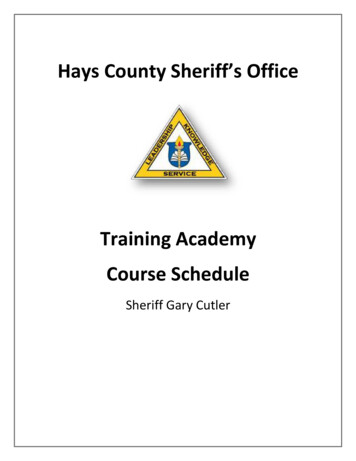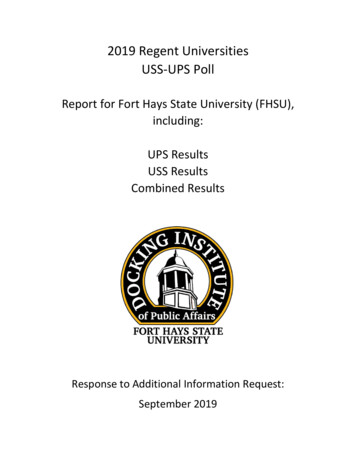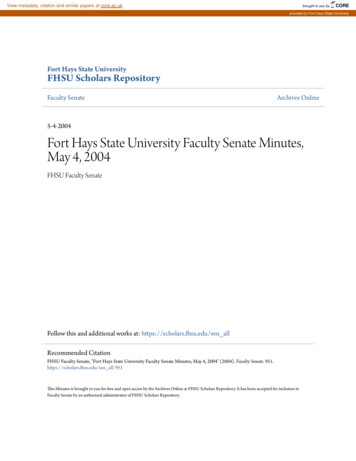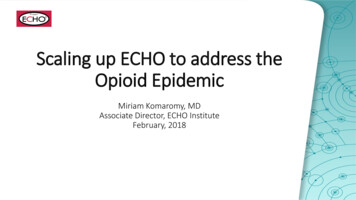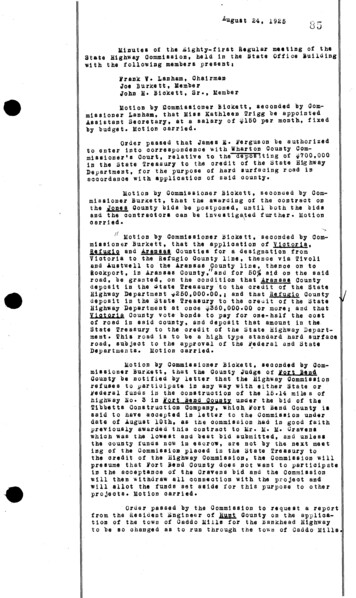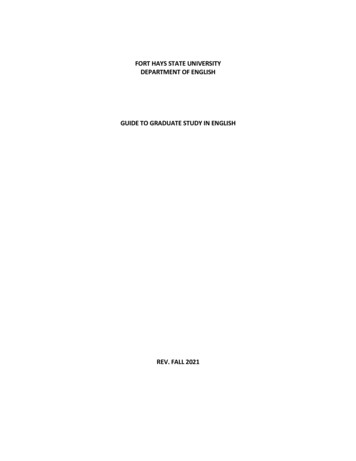
Transcription
FORT HAYS STATE UNIVERSITYDEPARTMENT OF ENGLISHGUIDE TO GRADUATE STUDY IN ENGLISHREV. FALL 2021
CONTENTSMASTER OF ARTS IN ENGLISH . 3CURRICULUM . 4GRADUATE FACULTY . 5ADMISSION TO GRADUATE STUDY . 6YEAR-ROUND MA IN ENGLISH PROGRAM. 6SUMMER MA IN ENGLISH PROGRAM . 6PROBATION AND DISMISSAL . 7PROGRAM OF STUDY . 7ADMISSION TO CANDIDACY . 8ENGLISH 890: CONTINUING GRADUATE EDUCATION . 8ENGLISH 898: GRADUATE ENGLISH COURSE PAPER . 8GUIDELINES FOR THE COMPREHENSIVE EXAMINATION . 9APPEALS. 11INDEPENDENT STUDY. 11OBLIGATIONS OF THE STUDENT . 12APPENDIX 1: FORMAT FOR TITLE PAGE OF GRADUATE ENGLISH COURSE PAPER . 13APPENDIX 2: READING LISTS FOR COMPREHENSIVE EXAMS . 14APPENDIX 3: SAMPLE COMPREHENSIVE EXAM QUESTIONS . 22APPENDIX 4: INDEPENDENT STUDY APPLICATION . 242
MASTER OF ARTS IN ENGLISHThe graduate program in English at Fort Hays State University leads to the Master of Arts degree.The English Department offers two programs of study for the MA in English: 1) a traditional MAprogram (wherein students take classes during the fall, spring, and/or summer), and 2) asummer MA program (wherein students may opt to take classes only during the summer).Students in both programs meet the same requirements as described in the Curriculum sectionbelow. Designed to enable students to improve their professional preparation for teaching English,the program is sufficiently flexible to permit those interested in pursuing non-teaching careers toobtain a Master of Arts degree in the liberal arts tradition. Those pursuing doctoral studies inEnglish find that this program is excellent preparation. The program outcomes of the program aredefined as follows:Program Student Learning Outcomes (SLOs)Analyze masterfully how a text engages the conventions of a givengenre alone and in relation to other texts.Construct a sustained, sophisticated, and original argument on aspecialized topic that draws on advanced research material.Construct a sustained, sophisticated, and original argument on aspecialized topic that is situated professionally in the criticaldialogueCompose effectively in academic and professional genres relatedto the discipline of English.Document diverse and specialized research materials ethically,precisely, and accurately according to current disciplinarystandards.Evaluate masterfully language and expression appropriate to thesituation using knowledge of grammars and other aspects oflanguage as medium for communication and literary and culturalexpression.Contextualize masterfully literary texts among historical literaryperiods and movements specific to British literature.Contextualize masterfully literary texts among historical literaryperiods and movements specific to American literature.Evaluate the effectiveness and appropriateness of criticalapproaches to achieve a stated research goal.Discuss contemporary issues in the study of literature, boththeoretical and disciplinary.3
CURRICULUMMaster of Arts in English (30 hours)Requirements: ENG 826: Approaches to Graduate Studies in English ELECTIVES: Courses numbered 600 or above (see note below regarding 601) ENG 898: Graduate English Course Paper ENG 890: Continuing Graduate Research (Fall only, until degree completion) Comprehensive Exam3 hours27 hours0 hours0 hoursNotes:The MA in English requires students to complete 30 credit hours of graduate-level classes withineight years. A minimum of 24 credit hours must be completed through regularly scheduled oncampus courses at FHSU. The remaining six credit hours may, of course, also be taken in thetraditional on-campus courses. However, the student may elect to complete the other 6 credithours in alternative ways: Approved courses taken elsewhere may be transferred to the program if taken within 6years prior to completing the program.Independent projects/apprenticeships (ENG 674 or 676) may be counted toward thestudent’s program. Note: such courses are offered only under greatly extenuatingcircumstances and require approval.Virtual English classes through FHSU may count if taken at the graduate level.Thesis Option: A student may count 2-6 hours of THESIS (ENG 899) toward the plan ofstudy and submit a thesis before the program completion. A student wishing to pursue thethesis option must obtain the consent of a member of the graduate faculty to chair thethesis committee and the consent of two other members of the graduate faculty to serveas readers. Students who write a thesis must still take the comprehensive exam. It is thestudent’s responsibility to form a thesis committee. For details on the thesis, see theGraduate School’s “Thesis and Field Study Guidelines.”4
GRADUATE FACULTYLexey Bartlett (PhD, University of North Texas, 2005). Areas of Expertise: British and ComparativeLiterature, Nineteenth Century to the Present; Critical Theory; MythologyCheryl Hofstetter Duffy (PhD, University of Kansas, 1996). Areas of Expertise: Composition andRhetoric, English Language, Service LearningPerry Harrison (PhD, Baylor, 2018) Areas of Expertise: History of the English Language,Linguistics, Old and Middle English Literature, Old Saxon Literature, Technical WritingSharla Hutchison (PhD, University of Oklahoma, 2002). Areas of Expertise: British and AmericanLiterary Modernism, Women's Writing, Critical Theory, Gothic LiteratureEric Leuschner (PhD, University of Missouri-Columbia, 2004). Areas of Expertise: History andTheory of the Novel, Eighteenth-Century British LiteratureMichael Meade (PhD, University of Wisconsin, 1969). Areas of Expertise: Twentieth-CenturyEuropean Novel; French, German, Italian; Literary Criticism; Renaissance Art and LiteraturePauline Scott (PhD, University of Wisconsin-Madison, 1994). Areas of Expertise: Early ModernLiterature, Comparative Literature, and Literary TheoryMatthew Smalley (PhD, University of Kansas, 2016). Areas of Expertise: 19th Century AmericanLiterature and Culture, Early American Literature, African American Literature, US Literature ofthe Immigrant Experience, Religion and Literature, 20th Century American LiteratureBrett Weaver (PhD, University of North Texas, 2000). Areas of Expertise: Creative Writing(Fiction and Drama), Latin-American LiteratureBradley Will (PhD, University of Oklahoma, 1998). Areas of Expertise: Twentieth-CenturyAmerican Literature, Literary Theory, Science Fiction and Fantasy Literature, the Sublime5
ADMISSION TO GRADUATE STUDYThe procedures for seeking admission to the graduate program are described on the GraduateSchool website www.fhsu.edu/gradschl . Students will be admitted to graduate study in Englishaccording to the following criteria:1. A bachelor's degree with a 3.0 GPA in a minimum of 18 hours of English courses beyondthe general studies composition courses. At least one course must be in Americanliterature, and at least one course must be in British literature.2. Students who do not meet the basic requirements may enroll in the graduate program, butthey must remove their deficiencies by taking approved undergraduate courses or havegraduate courses added to the program of study.3. In addition to materials requested by the Graduate School, the English Department alsorequires applicants to submit two letters of recommendation and a personal statement.TRADITIONAL YEAR-ROUND MA PROGRAMThe Department of English offers courses year-round for students pursuing a master’s degree on atraditional academic schedule. Students in the year-round program are eligible to apply forGraduate Teaching Assistantships. See the Graduate School webpage for information andapplication materials for GTA positions.SUMMER MA IN ENGLISH PROGRAMThe Department of English also offers a Summer MA program designed to make it possible for thein-service teacher to earn a master's degree in two years while remaining on the job.* The basicassumption is that only certain activities—attending classes, listening to lectures, participating indiscussions, utilizing library resources for research—need to be performed on campus andcompleted in two consecutive summer sessions, while other activities—reading the assignments,writing papers, developing projects—can be performed off campus. Some courses will completerequirements within the term.In order to complete the program in two years, participants enroll for credit in 5 courses (15 hours)each summer, meeting the requirements of all 5 courses, with the exception of out-of-class papersand projects, and taking automatic incompletes. While off-campus in the fall semester, studentswrite the papers and projects for all 5 courses, and remove their incompletes by the followingMay. In addition, students will not complete the degree until they have passed two required zerocredit courses (ENG 890 and ENG 898) and the comprehensive examination.6
Calendar for completion in two summers:1. January-March. Contact the Department of English or consult the web site www.fhsu.edu/english for a reading list for the first summer's courses.2. Apply for admission to the graduate school www.fhsu.edu/gradschl .3. February-May. Read the assigned works on the list and make initial contact with graduateadvisor.4. June-July. Enroll and take the first summer's courses (fifteen hours).5. August. Enroll in ENG 890 and complete self-assessment.6. August-December. Write the assigned papers based on the first summer's courses.7. January-April. Obtain syllabi and a reading list for the second summer's courses.8. February-May. Read the assigned works on the list.9. June-July. Enroll and take the second summer's courses (fifteen hours).10. August-December. Write the assigned papers based on the second summer's courses.11. Register for and take the comprehensive examination. Students are expected to havecompleted the majority of their graduate hours before they will be eligible to sign up forthe exam. Students who have taken fewer than 21 graduate hours must have securedpermission of the graduate advisor and department chair prior to signing up.*The program also allows students to complete the course requirements in three or more years ifthis better suits their needs, although validation restrictions will apply after seven years. Studentschoosing the longer plan will follow the same procedure but will enroll in fewer hours eachsummer. (Students need to be aware, however, that if they choose to complete the degree inthree years, they might need to attend both the June and July sessions for one of the summers.)PROBATION AND DISMISSALStudents who do not maintain a 3.0 average will be placed on academic review and may besubject to dismissal from the program.PROGRAM OF STUDYA Program of Study is required by the Graduate School to be submitted prior to the completion of9 hours. The Program of Study lists all courses taken and a plan of additional courses to be taken tocomplete the program. Since the English MA program is elective heavy and course topics are notdecided until the semester prior to offering, the English Department office will amend the POS ascourses are taken. However, it is strongly recommended that students consult with their advisor tomake a tentative plan and proposed areas of concentration. The Department will make everyeffort to inform students of course offerings as soon as possible.7
ADMISSION TO CANDIDACYAdmission to candidacy is an important step in the completion of a graduate degree program. Agraduate student may apply for admission to candidacy upon the successful completion of atleast nine hours of graduate study and upon filing an approved program of study inconsultation with the major advisor and departmental graduate committee or its delegatecommittee. Application for candidacy should be made before completing no more than 15hours in order to avoid the possibility of extending the program. The student must berecommended for candidacy by the advisor, the departmental graduate committee, and thedepartment chair. The student is admitted to candidacy by the Graduate Dean.1. To be admitted to candidacy, the student must have:2. satisfactorily passed the preliminary or other qualifying examination if either is requiredby the major department3. removed all deficiencies for admission to graduate study4. earned a B average (3.00) in all graduate courses that are a part of the degree programto that point5. filed in the Graduate School a program of study that has been approved by the GraduateDean6. completed a total of at least nine graduate program hoursThe student must be admitted to candidacy before being eligible to sign up for or take thecomprehensive examination or to file an Intent to Graduate.ENG 890 CONTINUING GRADUATE RESEARCHStudents must enroll in ENG 890 Continuing Graduate Research each fall semester until all otherprogram requirements are completed. This purpose of this course is for students to keep track oftheir progress through the program through a simple self-assessment report (template providedthrough the associated Blackboard portion of the course) that will also provide a means offormalized communication with the graduate advisor. The self-assessment is intended to helpstudents stay on track in the program and maintain access to university resources to facilitate theirresearch. Students may also enroll in ENG 890 in the spring so that they are considered properlyenrolled in order to have access to university resources. Because the course is zero credit hours,there is no associated tuition or fee cost. ENG 890 replaces the Requests for Extension.ENG 898 GRADUATE ENGLISH COURSE PAPERStudents must enroll in ENG 898 Graduate English Course Paper (typically after completion of themajority of their required graduate hours) and submit one approved copy of their strongestgraduate course paper to the English Department. The graduate course paper is a record of aresearch project or critical paper by the student under the supervision of a graduate facultymember in whose course the paper was written. It should demonstrate the student's8
understanding of, and skills in, research and critical writing. The paper must conform to thedocumentation style set forth in the most recent edition of the MLA Handbook for Writers ofResearch Papers. The Graduate English Course Paper should be 5000 to 8000 words (15 to 25pages in Times New Roman 12-point font, not including the works cited or title page). Papers thatdo not meet the minimum requirements of 5000 words (15 pages) and at least 4 quality secondarysources will not be accepted. It is the student’s responsibility to have an acceptable paper availableand may require revision of an earlier paper or work with an instructor on an additional researchproject for a class. Students should consider this requirement as they take classes to ensure theyhave an appropriate paper.The student's advisor must certify that the student has completed this requirement by filing thegraduate course paper in the English Office. The title page (see format in appendix 1) must besigned by the student's advisor, the department chair, or the professor for whom the paper waswritten. The paper may be appraised by other members of the graduate faculty if they are calledupon to recommend the student for future employment or further graduate study, or it may beused for program assessment.GUIDELINES FOR THE COMPREHENSIVE EXAMINATIONThe graduate examination requires students to demonstrate 1) knowledge of literary works andliterary history or studies of rhetorical or linguistic topics, 2) skill in analysis and synthesis, and 3)rhetorically effective writing. Prior to taking the examination, students will choose three subjectareas from the list below to “specialize” in. On the exam, students will be required to answerfour one-hour questions, two in their primary field of specialization and one in each of theother two. Students must allow themselves sufficient time to study the designated works and toread critical studies of the works or other appropriate background sources as they pursue theircourse of study through the program and prepare for the comprehensive exam.Subject Areas British Literature, Old English to 1660 British Literature, 1660 to 1900 American Literature, Beginnings to 1900 British and American Literature, post 1900 Writing Studies Language and Linguistics TESOL/Second Language Acquisition (we are not currently accepting applications in thisarea and coursework may not be offered)Students will choose three areas to study in preparation for the exam and as a complement totheir coursework in the program. Students should review lists and consider areas of interest onentering the program, read these works in conjunction with course readings, and choose courses9
that will enhance study of works on these basic lists with supplementary works and cultural,historical, and theoretical issues associated with the concentration. A rotation of courses isavailable that ensures courses from each area are offered within a two-year period. Each subjectarea will have a fixed reading list (to be reviewed every three years; see appendix 2)determined by the faculty who specialize in that subject area. The reading lists for each areaconsist of works in a variety of genres (poetry, long and short fiction, non-fiction, and drama) bymajor writers in the specified period or, in the case of Writing Studies, Language and Linguistics,and TESOL, of key works in the theoretical area.Questions will be designed to reveal the student's ability to make sense of literary works or toapply and discuss theories. For literature categories, questions may require students to discussliterary elements appropriate to the genre of the work. Any question on the written examinationmay assume that the candidate is knowledgeable about matters external to the literary work itself(e.g., historical and cultural contexts including literary movements) and commonly discussed incritical studies of that work. Questions may ask students to compare texts on the list or illustratethe development of a theme or topic among the works on a list. In addition, any question mayrequire the application of critical approaches to the work, such as feminist or postcolonial theories.For sample questions, see appendix 3.Each question will be graded by a committee of three faculty members knowledgeable in thearea, but the deciding vote for each question will be cast by a committee member whospecializes in the given area. In the case of a disagreement within the committee, otherspecialists in that area will be consulted for a final decision. Essays that show an understandingof the work but fail to address the question will not be considered as passing. It is stronglyrecommended that students admitted to the English MA program schedule a meeting with thegraduate advisor before their first semester of attendance to discuss their program of study andpreparation for the Graduate Comprehensive Examination. The key to successful completion ofthe exam is early preparation and the development of a plan of study. In addition, students shouldschedule a strategy session with the graduate advisor the semester before they intend to take theexam.Students may take the graduate exam more than once; however, if they fail the exam twice, theywill be advised to address any deficiencies and meet with the graduate advisor to discuss optionsfor continuing or withdrawing from the program. The graduate committee may recommendadditional course work. Moreover, students will repeat the exam only in the area(s) failed. Noparticular time interval is required before retaking the graduate exam, but students should consulttheir advisor before signing up to retake the exam. The exams are given three times a year (March,June, and October); a student must sign up for one of the scheduled exams with the GraduateSchool (see their webpage for deadlines). Exams will not be given at other times of the year.10
Students will adhere to the policies of the English graduate examination in place when theymatriculate; if the policy changes while they are in the graduate program, they may (but are notrequired to) agree in writing to abide by the revised one.Students may choose to take the exam off-campus with an approved proctor. Students who opt touse a proctor must obtain the proctor request forms from the English Department and submitcompleted forms to the graduate advisor. Students may also choose to take the exam using acomputer by installing Lockdown Browser. Students who choose this option must be enrolled ENG890 in order to access the Blackboard shell and exam. Please note that any technical difficulties(including loss of connection) does not affect the parameters of the exam.APPEALSStudents shall have protection through orderly procedures against arbitrary or capriciousacademic evaluation. In matters relating to evaluation of academic performance, aninformation as well as a formal procedure exists.The student should first consult with the professor(s) involved. If the issue is not resolved atthat level, the student may consult with the chair of the department who will, if necessary,inform the student of further informal appeals or of specific formal appeals procedures. Theformal appeals process begins with a written appeal to the department stating the specificarbitrary or capricious academic evaluation. A copy of the formal appeals procedure can befound here hool-Appeals/.INDEPENDENT STUDIESUnder special extenuating circumstances, a student may petition to conduct an independent studyfor 1-3 credit hours. No more than 6 hours of independent projects/apprenticeship (ENG 674 or676) may be counted toward the student’s program of study. Graduate students must have acumulative GPA of 3.0 or higher in graduate work; have completed at least 12 hours toward thegraduate degree; have received credit for ENG 826; and complete a course application that issigned by the student’s advisor and faculty member who will be supervising the study (seeappendix 4). Independent projects should not duplicate a regularly scheduled course currentlybeing offered. No faculty member is obligated to supervise an independent project, and thesupervising faculty must have expertise in the area of the proposed project. Applications forindependent projects must be submitted and approved prior to the first day of the semesterthe independent project is to be conducted.The application should show how the project/study will complement or enhance the student’s programof study better than taking a scheduled course. It should also demonstrate how it is equivalent to thenumber of credit hours proposed. The approval process is then to get the (1) approval of the11
instructor/facilitator (to ensure they are on board and are willing to commit the time and that it is anappropriate project); (2) the approval of your advisor (to ensure that it best fits your program of studyand goals—including preparation for exams); and (3) the approval of the chair (to ensure it doesn’tconflict with department policy or needs, matches the credit hour workload, and the faculty memberhas the appropriate expertise).OBLIGATIONS OF THE STUDENTAfter admission, students will keep the graduate school and their graduate advisor informed oftheir progress toward the degree. In addition, it will be the responsibility of the students to carryout the following:1. Satisfy the necessary prerequisites if deficiencies were specified on the application foradmission to graduate study (see Admission to Graduate Study above).2. Complete 30 hours of course work with an average grade of "B" or higher.3. Sign up for the Graduate Examination with the Graduate School at the proper time. Seenote under Guidelines for Comprehensive Exam regarding when a student is eligible.4. Pass the written Graduate Examination at the proper time.5. File an "Intent to Graduate" with the Graduate School and complete a file review at thebeginning of the semester or summer session of intended graduation.6. Enroll in ENG 898 Graduate English Course Paper and, as the sole requirement of this"course," file one approved copy of their best graduate course paper with the EnglishOffice.12
Appendix 1: Graduate Course Paper Title PageTITLEbyStudent's NameGraduate English Course PaperENG 898APPROVED:(Advisor or Course Professor)DATE:13
Appendix 2: Reading ListsReading List: British Literature to 1660Alfred the Great's Preface to Pastoral CareBeowulf (verse translation)Chaucer, Geoffrey. The Canterbury Tales (General Prologue, Knight’s Tale, Miller’s Tale,Wife of Bath’s Tale, Pardoner’s Tale, Nun’s Priest Tale) [middle English]“A Colloquy on Occupations”“The Dream of the Rood”Donne, John. “The Canonizaton”, “The Flea”, “A Valediction: Forbidding Mourning”, HolySonnets 9, 10, 14, 19EverymanJonson, Ben. “To Penshurst”Kyd, Thomas. The Spanish TragedyLanyer, Aemilia. “Eve’s Apology in Defense of Women,” “The Description of Cooke-ham”Malory, Thomas. Morte Darthur [“The Death of King Arthur’]Marlowe, Christopher. Doctor FaustusMarvell, Andrew. “To His Coy Mistress”Milton, John. Sonnet (On the Late Massacre in Piedmont); Sonnet (“When I Consider Howmy Light is Spent”); LycidasPhilips, Katherine. “A Married State”The Second Shepherd’s PlayShakespeare, William. Sonnets 18, 30, 55, 87, 116, and 130; A Midsummer Night's Dream,As You Like It, Hamlet, King LearSidney, Sir Philip. “The Defence of Poetry”; Astrophil and StellaSpenser, Edmund. The Faeire Queene, books 1 and 2“The Wanderer” or “The Seafarer”Webster, John. The Duchess of MalfiWroth, Lady Mary. Pamphilia to AmphilanthusReading List: British Literature, 1660-1900Arnold, Matthew. “The Function of Criticism at the Present Time;” “Dover Beach” and“Thyrsis”Austen, Jane. Pride and Prejudice OR EmmaBrowning, Robert. “My Last Duchess” and “Caliban upon Setebos”Behn, Aphra. OroonokoBlake, William. Songs of Innocence and Songs of ExperienceBrontë, Emily. Wuthering Heights14
Burns, Robert. “Tam O’Shanter,” “Auld Lang Syne,” “My Love Is Like a Red, Red Rose”Byron, George Gordon. ManfredColeridge, Samuel Taylor. The Rime of the Ancient MarinerConrad, Joseph. Heart of DarknessDickens, Charles. Hard Times OR Great ExpectationsDoyle, Arthur Conan. “The Speckled Band”Eliot, George. MiddlemarchFielding, Henry. Joseph AndrewsFinch, Anne. “The Spleen”Gaskell, Elizabeth. North and South OR Mary BartonGray, Thomas. “Elegy Written in a Country Churchyard”Hardy, Thomas. Tess of the D’UrbervillesHazlitt, William. “My First Acquaintance with Poets”Johnson, Samuel. Rambler, no. 4Keats, John. “To Autumn,” “Ode on a Grecian Urn,” “Ode on Melancholy,” “Ode to aNightingale”Kipling, Rudyard. “The White Man’s Burden” and “If—”Mill, John Stuart. The Subjection of Women, Chapter 1Milton, John. Paradise Lost (Book 1)Pope, Alexander. The Rape of the Lock (5-canto version)Richardson, Samuel. PamelaRossetti, Christina. “Goblin Market”Scott, Walter. WaverleyShelley, Mary. FrankensteinShelley, Percy. “A Defence of Poetry,” “Ode to the West Wind,” “Ozymandias,” and “MontBlanc”Sheridan, Richard. She Stoops to ConquerStevenson, Robert Louis. Dr. Jekyll and Mr. HydeSwift, Jonathan. Gulliver’s TravelsSwinburne, Algernon Charles. “The Garden of Proserpine” and “Hymn to Proserpine”Tennyson, Alfred. “Ulysses” and selections from In MemoriamWalpole, Horace. The Castle of OtrantoWilde, Oscar. The Importance of Being EarnestWollstonecraft, Mary. A Vindication of the Rights of Woman, Introduction and Chapters 1,2, and 4Wordsworth, William. Preface to Lyrical Ballads; “Lines Written a Few Miles above TinternAbbey” and “Ode: Intimations of Immortality”Wycherly, Williamm. The Country Wife15
Reading List: American Literature, Colonial to 1900Apess, William. Son of the ForestBradstreet, Anne. “The Author to Her Book” and “Upon the Burning of Our House”Brown, Charles Brockden. WielandBryant, William Cullen. “Thanatopsis” and “The Prairies”Chesnutt, Charles. “The Goophered Grapevine” and “Po’ Sandy”Chopin, Kate. The AwakeningCooper, James Fenmore. The Last of the MohicansDavis, Rebecca Harding. Life in the Iron-MillsDickinson, Emily. Nos. 236, 340, 409, 598, and 620 (Franklin sequence)Douglass, Frederick. Narrative of the Life of Frederick DouglassEdwards, Jonathan. “A Divine and Supernatural Light”Emerson, Ralph Waldo. “Self-Reliance,” “The Divinity Sc
Thesis Option: A student may count 2-6 hours of THESIS (ENG 899) toward the plan of study and submit a thesis before the program completion. A student wishing to pursue the thesis option must obtain the consent of a member of the graduate faculty to chair the thesis committee and the consent of two other members of the graduate faculty to serve
